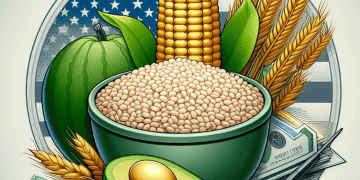In a significant move aimed at stabilizing food prices and ensuring food security, the government has announced the approval of a 150-day duty-free window for the importation of maize, rice, and wheat. This decision is part of a broader strategy to address current food supply challenges and mitigate the impact of rising global food prices on the local market.
The announcement was made during a press briefing by the relevant government agency, highlighting the urgency and importance of the measure. According to officials, the duty-free window is expected to ease the burden on importers and ultimately reduce the prices of these essential food items for consumers.
The duty-free period, which spans 150 days, will allow importers to bring in these key agricultural products without the usual customs duties. This temporary suspension of duties is intended to boost the availability of maize, rice, and wheat in the market, thus addressing potential shortages and curbing inflationary pressures on food prices.
Stakeholders in the agricultural and trade sectors have expressed cautious optimism about the initiative. Industry experts believe that the duty-free window will provide much-needed relief in the short term. However, they also emphasize the need for sustainable long-term solutions to enhance domestic agricultural production and reduce reliance on imports.
The decision comes amid growing concerns over food inflation, which has been exacerbated by various factors including supply chain disruptions, adverse weather conditions, and geopolitical tensions affecting global grain markets. By facilitating easier and more affordable importation of these staple grains, the government aims to stabilize prices and ensure that food remains accessible to all segments of the population.
In addition to the duty-free window, the government is reportedly exploring other measures to support local farmers and boost domestic production. These include providing subsidies, improving access to agricultural inputs, and investing in infrastructure to enhance productivity and reduce post-harvest losses.
Critics of the duty-free window have raised concerns about its potential impact on local farmers, who may struggle to compete with the influx of imported grains. They argue that while the measure may provide immediate relief, it could undermine efforts to achieve self-sufficiency in food production in the long run.
In response to these concerns, government officials have reiterated their commitment to balancing short-term relief with long-term agricultural development. They assure that the duty-free window is a temporary measure and part of a comprehensive approach to ensure food security and price stability.
As the duty-free period takes effect, all eyes will be on its implementation and impact on the market. Importers and consumers alike will be watching closely to see if the measure achieves its intended goals of easing supply constraints and lowering food prices.
Your go-to for supply chain report news updates: The Supply Chain Report. For international trade tools, see ADAMftd.com.
#DutyFreeWindow150Days #GovernmentFoodPolicy #MaizeRiceWheatImport #FoodSecurityMeasures #StabilizeFoodPrices #AgriculturalImports #FoodInflationRelief #ImportDutySuspension #MarketSupplyBoost #ShortTermReliefLongTermGoals #AgricultureSupport #LocalFarmersImpact #GlobalFoodPriceConcerns #FoodSupplyChallenges















